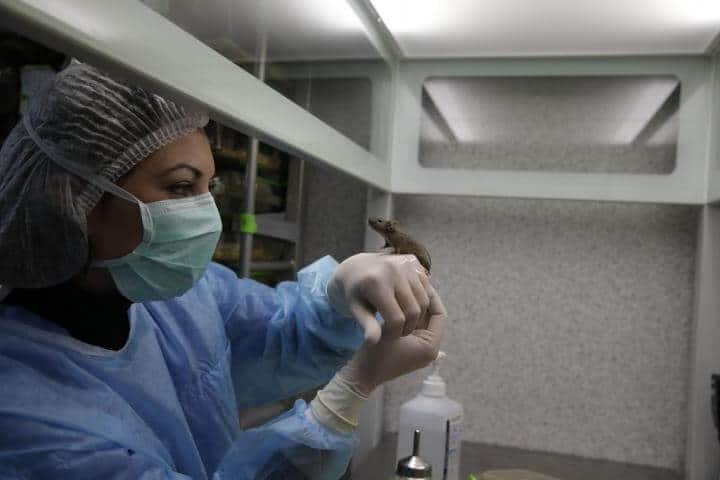A group of Russian and Swedish scientists just published a breakthrough paper, reporting results of a joint study by Lomonosov Moscow State University and Stockholm university. The article was published in the US journal Aging.
The major goal of the study was to investigate the role of intracellular powerstations — mitochondria — in the process of ageing of organism. Importantly, scientists made an attempt to slow down ageing using a novel compound: artificial antioxidant SkQ1 precisely targeted into mitochondria. This compound was developed in the Moscow State University by the most cited Russian biologist professor Vladimir Skulachev.
Experiments involved a special strain of genetically-modified mice created and characterized in Sweden. A single mutation was introduced into genome of these mice resulting in the substantially accelerated mutagenesis in mitochondria. This leads to accelerated ageing and early death of the mutant mice. They live less than 1 year (normal mouse lives more than 2 years). The mutation promotes development of many age-related defects and diseases indicating that the major defect of these mice is indeed ageing.
Starting from the age of 100 days one group of mutant mice was treated with small doses of SkQ1 (approx. 12 micrograms) added into their drinking water. Per scientists’ hypothesis, the compound must protect animal cells from the toxic byproducts of mitochondria — free radicals (reactive oxygen species). Another group of animals served as a control group receiving pure water.
Differences between the two groups became obvious starting from the age 200-250 days. Animals in the control group aged rapidly as expected. They were losing weight, their body temperature decreased, severe curvature of the spine (as a result of osteoporosis) and alopecia were developing, their skin became thinner, and in case of females estrus cycle was impaired. Finally their mobility and oxygen consumption were decreased. The development of all these typical traits of ageing was dramatically decelerated in the group treated with SkQ1. Some of the ageing traits did not appear in that group at all.
Professor Vladimir Skulachev, the creator of SkQ1 molecule design and co-author of this study, says: “This work is quite valuable from both theoretical and practical points of view. First, it clearly demonstrates the key role of mitochondrially produced reactive oxygen species in the process of ageing of mammals. At the same time our study opens the way to the treatment of ageing with mitochondrially targeted antioxidants. We are also very honored to cooperate within this project with such prominent Swedish scientists as prof. Barbara Cannon who has such title as the President of Royal Swedish Academy of Sciences in her CV and prof. Jan Nedergaard, Head of Wenner-Gren institute”.
Prof. Skulachev’s project is now developing a set of pharmaceuticals based on SkQ1 molecule. The first drug — Visomitin eye drops — is already approved and marketed in Russia, it also passed phase 2 clinical trials in US. The next pharmaceutical product in project’s pipeline is an oral form of SkQ1 (similar to the one used in the aforementioned experiments). It is now in the process of clinical trials in Russia. In case of positive results of these trials, such “anti-ageing” drug can be approved for systemic indications in 2-3 years.


are we able to get skq1 from outside the area of study??when will it become with in our reach…i need it yesterday>>>>>why is it that something this could save many people lives and give them better healthy lives as well take so long to bring to the market???we should have access now/
Actually 4 products are already on sale: eye-drops, hydrogel, anti-aging serum and something else… They are available in some online-servises (I`ve ordered in Cosmicnootropic, they have international delivery)
I don’t think we would be expecting such antioxidant in market for at least a decade. This is just initial study, I don’t think scientists have reckoned the side effects yet.
Omasta..do you suggest an effective medicine to this disease?
Do not make the illusion that they will become rich in SKQ sales. In Australia, they sell a similar mitochondrial antioxidant MitoQ and it sells so little. They sell it all over the world and make sales as a sex shop for one person in a small town.
If people knew how well mitoQ works it would sell a lot more. In about two months I’ve gone from cataracts severe enough to make seeing lane markers at night difficult, stars around any light, stars themselves just blurry blotches, the moon even a blurry blotch to now lights are just lights with no star effects, I can see lane markers, I can see stars again as stars, I can the moon clearly. I’ve gone from sleeping 10 hrs/day to 8, my blood sugar levels are better, I’m not hungry all the time and I’m losing weight without dieting.
I really look forward to skq1 to hit the market… Wish I could order it now..
It’s what we need now in such a world where so many are suffering from age related issues… Hasan
Do not wait for SKQ1. This will be several times more expensive than current antioxidants, which extend life to 300%. SKQ also has disadvantages. E.g. You are 50 years old and you need to be 60 years old in just 30 years. You have to use SKQ1 for 30 years.
Hi,
I’m Ketki
I would like to contribute an article around “Antioxidants Market”
If this is something you are willing to consider, we would send you an email, attaching the article.
I look forward to hearing back from you.
Thanks and Regards,
Ketki Vaze